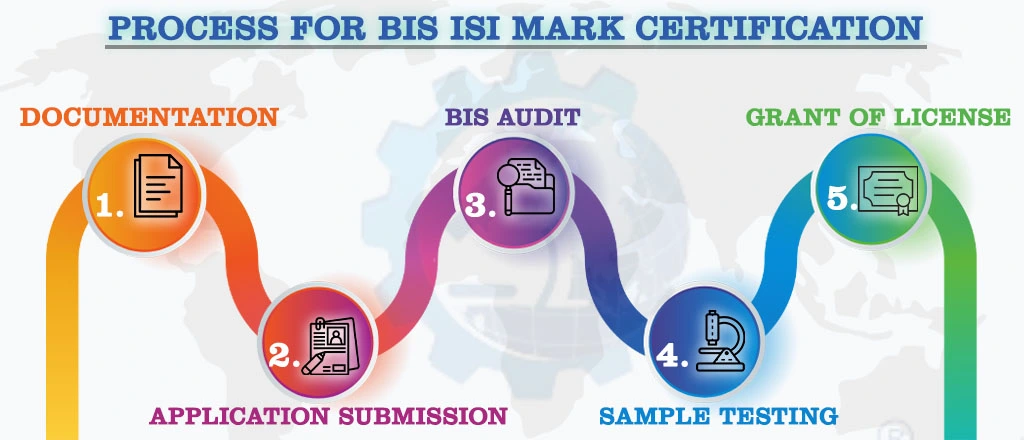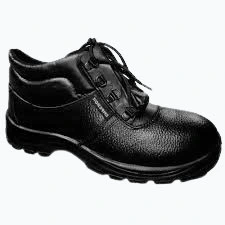BIS CERTIFICATION FOR LEATHER SAFETY FOOTWEAR MOULDED PVC SOLE
IS 14544:1998
In this competitive scenario, it isn't easy to survive in the market without a standard quality and certified product. BIS license may also be required to sell products in the Indian market.
To get BIS certification and produce a standard quality product, the manufacturer must ensure that their product must follow the specified Indian standard.
Let's take a closer look at IS 14544:1998 for Leather Safety Footwear with Direct Moulded Polyvinyl Chloride (PVC) Sole.
Leather safety footwear with direct moulded polyvinyl chloride (PVC) sole is covered under IS 14544:1998. The Bureau of Indian Standards adopted this Indian Standard after the Footwear Sectional Committee's final draft was approved by the Chemical Division Council.
This standard applies to leather safety boots and shoes with direct moulded polyvinyl chloride (PVC) soles that are used in the industry and have general purpose oil and chemical resistance. A separate Indian Standard 'IS 11226: 1993' already covers leather safety footwear with direct moulded rubber soles.
The requirements, tests, and sampling methods for leather safety footwear with steel toe caps and direct moulded soles made of PVC as the primary raw material are specified in this standard.
Depending on their design, leather safety footwear with direct moulded PVC soles shall be of the following three types:
- Type 1 - General purpose safety shoes.
- Type 2 - Safety shoes with oil-resistant soles.
- Type 3 - Safety shoes with chemical resistant soles.
All types and designs of leather safety footwear shall be made by direct moulding from chrome-tanned upper leather with cleated soles and heals with a slip-resistant pattern. Full chrome leather conforming to IS 5677 shall be used for the upper. The footwear must be manufactured using either the direct moulding process (DMP) or the direct injection process (DIP).
Tests:
The following test shall be carried out:
- Performance test
- Impact test
- Adhesion Test on Moulded Bottoms
If any, Footwear sizes and trademarks must be incorporated into the mould in order for them to be legible on the outer sole's waist. On the insole waist and the full sock, the size and fitting number and the year of manufacture must be legibly marked. The product may also bear the Standard Mark (ISI Mark), and the standard's packing specifications must be followed. The Manufacturer must obtain a BIS license from the Bureau of Indian Standards to use a standard mark (ISI Mark). The BIS grants a license based on a successful assessment of manufacturing infrastructure, quality control and testing capabilities, and production process during a visit to manufacturing premises.

NOTE:
For Detailed Information about the Procedure for BIS ISI Certification,
Visit :
ISI Mark Certification for Domestic ManufacturersISI Mark Certification for Foreign Manufacturers
Conclusion:
If a product falls under the scope of the BIS Conformity Assessment Scheme, All the manufacturers, importers, and foreign entities must obtain BIS ISI Certification. The Bureau may cancel the License if the product fails to meet certification requirements.
Aleph INDIA has been serving the industry as a single-window operator for all product regulatory compliance. We can assist importers or manufacturers in meeting all criteria for importing or selling a product in the Indian market.
International Audits & Participation
Testimonials
BIS REGISTRATION FOR ELECTRONIC & IT PRODUCT
In the era of globalization, world trade is growing rapidly and henceforth, Manufacturing and Import/Export businesses are also growing drastically...View More
BIS CERTIFICATE FOR FOREIGN MANUFACTURER
The Economy of India-the fastest developing economy on the globe with the capabilities that help it matches up with the biggest international...View More
PRODUCT CERTIFICATION SCHEME (ISI MARK) FOR DOMESTIC MANUFACTURERS
Anything a person buys from food to cars, clothes to electronics, branded to unnamed products there is always a question that wanders in one’s...View More
WIRELESS PLANNING AND COORDINATION (WPC)
WPC: Wireless means communication done from one point to another point without the wires and cables. Electromagnetic waves carry the ...View More
BUREAU OF ENERGY EFFICIENCY (BEE) CERTIFICATE
BEE CERTIFICATE: Energy is the future, and its conservation is the way of the bright future. Everyone claims the environment is important...View More
E-WASTE MANAGEMENT
E-waste is one of the world's fastest-growing trash streams. We currently manufacture almost 50 million tones of it each year...View More
Request a call back.
Would you like to speak to one of our Senior Technical advisers over the phone? Just submit your details and we’ll be in touch shortly. You can also email us if you would prefer.
BIS REGISTRATION FOR ELECTRONIC & IT PRODUCT
In the era of globalization, world trade is growing rapidly and henceforth, Manufacturing and Import/Export businesses are also growing drastically...View More
BIS CERTIFICATE FOR FOREIGN MANUFACTURER
The Economy of India-the fastest developing economy on the globe with the capabilities that help it matches up with the biggest international...View More
PRODUCT CERTIFICATION SCHEME (ISI MARK) FOR DOMESTIC MANUFACTURERS
Anything a person buys from food to cars, clothes to electronics, branded to unnamed products there is always a question that wanders in one’s...View More
WIRELESS PLANNING AND COORDINATION (WPC)
WPC: Wireless means communication done from one point to another point without the wires and cables. Electromagnetic waves carry the ...View More
BUREAU OF ENERGY EFFICIENCY (BEE) CERTIFICATE
BEE CERTIFICATE: Energy is the future, and its conservation is the way of the bright future. Everyone claims the environment is important...View More
E-WASTE MANAGEMENT
E-waste is one of the world's fastest-growing trash streams. We currently manufacture almost 50 million tones of it each year...View More
View All Services
Request a call back.
Would you like to speak to one of our Senior Technical advisers over the phone? Just submit your details and we’ll be in touch shortly. You can also email us if you would prefer.






























